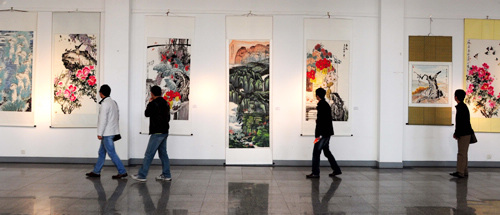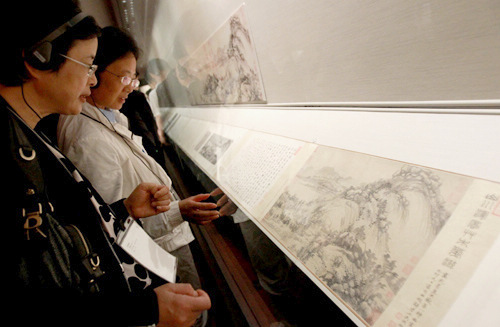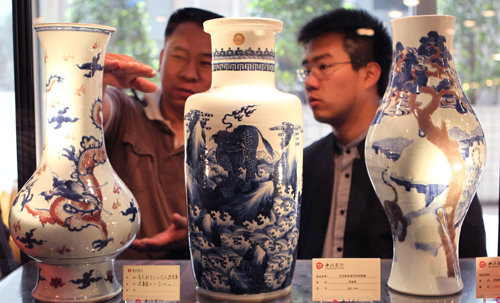|
 |
|
Visitors appreciate paintings at an art gallery in Wuhan, Hubei Province (DU HUAJU) |
The newly refurnished National Art Museum of China opened to visitors for free on March 2. The new museum, covering an area of nearly 200,000 square meters, is the largest museum in the world.
In addition to the National Art Museum of China, public art museums at national and provincial levels also stopped charging admission. Meanwhile, all public libraries and cultural centers are to have barrier-free, zero-threshold access by the end of 2011 as part of China's campaign to offer the citizens free access to public cultural facilities, which started on February 10. Other levels of art galleries are to be opened to the public for free by the end of 2012.
The Central Government plans to provide special subsidies to such facilities in less developed central and west China. In addition, local governments are required to provide funds to art galleries and libraries at all levels, enabling them to continue operating and improving services without relying on entrance fees. Private investors are also encouraged to invest in or donate to museums and libraries.
 |
|
Museum goers in Taipei appreciate the two parts of Dwelling in the Fuchun Mountains (XINHUA) |
The renowned Chinese landscape painting, Dwelling in the Fuchun Mountains, by Huang Gongwang (1269-1354), was displayed in its entirety at an exhibition in the "National Palace Museum" in Taipei from June 1 to September 25.
This great cultural event across the Taiwan Straits attracted a flood of attention because it was the first time for the two parts of the great work to come together since they were burnt apart 360 years ago. For more than 60 years, half of the painting has been kept in a museum in Hangzhou, capital of South China's Zhejiang Province, while the other half has been housed in the "National Palace Museum" in Taipei. Its reunion also symbolizes the end of the history when the people separated by the Straits didn't see each other for decades.
A group of 50 Chinese authors posted an open letter online accusing Baidu, China's biggest search engine, of stealing their work and infringing copyright laws on March 15, the World Consumer Rights Day.
They said Baidu Wenku, Baidu's online literary database, provided free download service of their works without paying copyright royalties. They claimed Wenku was damaging original Chinese literature. In response to the accusation, Baidu Wenku deleted nearly 3 million potentially infringed items from its literary section.
Online copyright infringement has become a prominent problem as everything goes digital in the information age. Among others, Baidu's case has called for public awareness on and effective measures of copyright protection in the virtual world.
 |
|
Fine blue and white porcelain vases of the Qing Dynasty (1644-1911) (ZHAN YANHUI) |
Artwork prices hit new records at auctions this year after China became the world's largest art market in 2010. The artwork transaction volume this year is expected to more than double last year's figure, powered by the country's double-digit economic growth.
Behind the prosperity, however, a number of problems have plagued China's art market for years. Auction companies sell fake artwork without punishment. Unqualified experts and art agencies offer unreliable endorsements and certificates. Counterfeiters grow in numbers. To resolve these knotty issues, qualified third-party artwork authentication and valuation agencies have to be established. While reinforcing supervision, the authorities also need to toughen legislative efforts to regulate the market and curb artwork counterfeiting.
| 